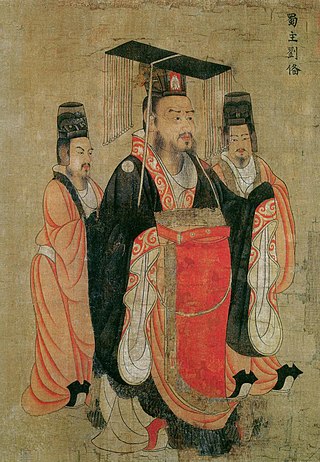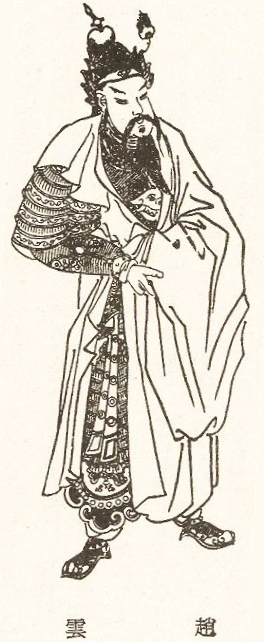Related Research Articles

The Battle of Xiaoting (猇亭之戰),also known as the Battle of Yiling and the Battle of Yiling and Xiaoting,was fought between the state of Shu and the state of Wu,between the years 221 and 222 in the early Three Kingdoms period of China. The battle is significant because Wu was able to turn the situation from a series of initial losses into a defensive stalemate,before proceeding to win a decisive victory over Shu. The Wu victory halted the Shu invasion and preceded the death of Liu Bei,Shu's founding emperor.

Liu Bei,courtesy name Xuande (玄德),was a Chinese warlord in the late Eastern Han dynasty who later became the founding emperor of Shu Han,one of the Three Kingdoms of China.

Zhao Yun,courtesy name Zilong (子龍),was a military general who lived during the late Eastern Han dynasty and early Three Kingdoms period of China. Originally a subordinate of the northern warlord Gongsun Zan,Zhao Yun later came to serve another warlord,Liu Bei,and had since accompanied him on most of his military exploits,from the Battle of Changban (208) to the Hanzhong Campaign (217–219). He continued serving in the state of Shu Han –founded by Liu Bei in 221 –in the Three Kingdoms period and participated in the first of the Northern Expeditions until his death in 229. While many facts about Zhao Yun's life remain unclear due to limited information in historical sources,some aspects and activities in his life have been dramatised or exaggerated in folklore and fiction. In the 14th-century historical novel Romance of the Three Kingdoms,he was lauded as a member of the Five Tiger Generals under Liu Bei.

Zhang Fei,courtesy name Yide (益德),was a Chinese military general and politician serving under the warlord Liu Bei in the late Eastern Han dynasty and early Three Kingdoms period of China. Zhang Fei and Guan Yu,who were among the earliest to join Liu Bei,shared a brotherly relationship with their lord and accompanied him on most of his early exploits. Zhang Fei fought in various battles on Liu Bei's side,including the Red Cliffs campaign (208–209),takeover of Yi Province (212–214),and Hanzhong Campaign (217–218). He was assassinated by his subordinates in 221 after serving for only a few months in the state of Shu Han,which was founded by Liu Bei earlier that year.

Zhuge Liang's Northern Expeditions were a series of five military campaigns launched by the state of Shu Han against the rival state of Cao Wei from 228 to 234 during the Three Kingdoms period in China. All five expeditions were led by Zhuge Liang,the Imperial Chancellor and regent of Shu. Although they proved unsuccessful and ended up as a stalemate,the expeditions have become some of the best known conflicts of the Three Kingdoms period and one of the few battles during it where each side fought against each other with hundreds of thousands of troops,as opposed to other battles where one side had a huge numerical advantage.

Cao Zhen,courtesy name Zidan,was a military general of the state of Cao Wei during the Three Kingdoms period of China. He was an adopted son of Cao Cao,a warlord who rose to power in the late Eastern Han dynasty and laid the foundation for Wei. After Cao Cao's death and the end of the Eastern Han dynasty,Cao Zhen served under Cao Pi and Cao Rui,the first two emperors of Wei. He is best known for leading a successful defence of Wei from the first two of a series of invasions by Wei's rival state,Shu Han,between 228 and 229.
Guo Huai,courtesy name Boji,was a Chinese military general of the state of Cao Wei during the Three Kingdoms period of China. He started his career towards the end of the Eastern Han dynasty under the warlord Cao Cao as a subordinate of Cao Cao's generals Xiahou Yuan and Zhang He. During the Three Kingdoms period,he served in Wei,the state established by Cao Cao's son Cao Pi,and lived through the reigns of four Wei emperors. From the 220s until his death in 255,he governed and defended Wei's western borders in Yong and Liang provinces. During this time,he resisted multiple invasions by Wei's rival state,Shu Han,and quelled some rebellions by local Qiang,Di and other non-Han Chinese tribes.

The Empty Fort Strategy involves using reverse psychology to deceive the enemy into thinking that an empty location is full of traps and ambushes,and therefore induce the enemy to retreat. It is listed as the 32nd of the Thirty-Six Stratagems. Some examples are listed in the following sections.
Chen Shi was a military officer of the state of Shu Han in the Three Kingdoms period of China. He previously served under the warlord Liu Bei in the late Eastern Han dynasty. His name is sometimes recorded as Chen Jie.
Wu Ban,courtesy name Yuanxiong,was a Chinese military general of the state of Shu Han in the Three Kingdoms period of China.
The war between Cao Cao and Zhang Xiu was fought between the warlords Cao Cao and Zhang Xiu between 197 and 199 in the late Eastern Han dynasty of China. It concluded with Zhang Xiu's surrender to Cao Cao.

Zhang Yi,courtesy name Bogong,was a Chinese military general and politician of the state of Shu Han during the Three Kingdoms period of China. Born in the late Eastern Han dynasty,Zhang Yi was a 10th-generation descendant of Zhang Liang. He started his career as a scribe under the warlord Liu Bei,who founded Shu later,and gradually rose to the positions of a county prefect and commandery administrator. In the early 230s,he served as an area commander tasked with maintaining the peace in Shu's southern commanderies. In 234,he led the Shu vanguard during the Battle of Wuzhang Plains against Shu's rival state Wei. From 238 to 259,Zhang Yi steadily rose through the ranks to become one of Shu's top generals. During this time,although he strongly opposed the Shu general Jiang Wei's aggressive stance towards Wei,he still accompanied Jiang Wei on his military campaigns against Wei. In 263,he surrendered to Wei forces along with the Shu emperor Liu Shan when Wei launched a large-scale invasion of Shu. In the following year,Zhang Yi was killed by mutineers during a rebellion by the Wei general Zhong Hui. Like Liao Hua and Zong Yu,Zhang was one of few officials who served the Shu-Han state throughout its entire existence.
Liu Bei's takeover of Yi Province was a military campaign by the warlord Liu Bei in taking control of Yi Province from the provincial governor,Liu Zhang. The campaign took place between the years 211 and 214 in the late Eastern Han dynasty;although the conflict between Liu Bei and Liu Zhang started in January or February 213 when the latter discovered the former secret communications and subsequently executed Zhang Song. It concluded with victory for Liu Bei and his successful takeover of the province from Liu Zhang in July 214. Yi Province would serve as the foundation of the state of Shu Han during the Three Kingdoms period.
Jiang Wei's Northern Expeditions refer to a series of eleven military campaigns launched by the state of Shu Han against its rival state,Cao Wei,between 240 and 262 CE during the Three Kingdoms period in China. The campaigns were led by Jiang Wei,a prominent Shu general. Unlike the previous Northern campaigns led by Zhuge Liang,which added Wudu and Yinping commanderies to Shu Han state territories,Jiang Wei's campaigns ended up being unpopular in both the military and civil circles in Shu. Also unlike Zhuge Liang's campaigns which often featured 60,000 to sometimes even 100,000 Shu Troops,Jiang Wei's were often much smaller rarely exceeding 30,000 even after the death of Fei Yi,where Jiang Wei assumed control of the military. The Zhuge Liang campaigns did suffer from logistical and supply issues for their large army. Zhuge's successor Jiang Wan,believed that it was the Hanzhong's mountainous terrain itself that were to blame for the campaigns failures and attempted to switch the route through the Han river. Fei Yi,who succeeded Jiang Wan,agreed,and never allowed any large campaigns to be launched by Hanzhong. Jiang Wei however overlooked these concerns and used Hanzhong as his home base as Zhuge Liang did.

LüMeng's invasion of Jing Province was fought between the warlords Sun Quan and Liu Bei in the winter of 219–220 in the late Eastern Han dynasty. Sun Quan's forces,led by LüMeng,invaded Liu Bei's territories in southern Jing Province,which covered present-day Hubei and Hunan. The campaign occurred after the Battle of Fancheng and concluded with victory for Sun Quan's forces,who completely captured all of Liu Bei's territories. Guan Yu,Liu Bei's general guarding those territories,was captured and executed by Sun Quan's forces. The fall of Jing Province and Guan Yu's death provided the trigger for the Battle of Xiaoting between Liu Bei and Sun Quan between 221 and 222.

The Conquest of Shu by Wei was a military campaign launched by the dynastic state of Cao Wei against its rival Shu Han in late 263 during the Three Kingdoms period of China. The campaign culminated in the fall of Shu Han and the tripartite equilibrium maintained in China for over 40 years since the end of the Eastern Han dynasty in 220. The conquest laid the foundation for an eventual reunified China under the Western Jin dynasty in 280.
The following is the order of battle for the Battle of Red Cliffs.

The Hanzhong Campaign was a military campaign launched by the warlord Liu Bei to seize control of Hanzhong Commandery from his rival,Cao Cao. The campaign took place between December 217 and August 219 during the prelude to the Three Kingdoms period. Although Cao Cao's forces had settled in Hanzhong Commandery two years prior after the Battle of Yangping,they were worn out by an overall Fabian strategy employed by Liu Bei's forces,who used targeted attacks to capture strategic locations from the enemy. One of these attacks resulted in the death of Xiahou Yuan,one of Cao Cao's top generals,delivering a huge blow to the morale of Cao Cao's forces. Due to logistical and other issues,Cao Cao was eventually forced to abandon Hanzhong Commandery and order a retreat in June 219. Liu Bei emerged victorious in the campaign and occupied Hanzhong Commandery,after which he declared himself "King of Hanzhong" in August of that year.
The Battle of Jiangling was fought between the forces of the Cao Wei and Eastern Wu dynasties in the early Three Kingdoms period of China. The battle,which took place around present-day Jiangling County,Hubei,was an integral part of the Wei emperor Cao Pi's three-pronged campaign against the Wu leader Sun Quan. It spanned a period of about six months from October 222 to April 223. Of the three fronts,the most critical Wei attacks were concentrated against the Wu fortress at Jiangling.
Zhao Yan,courtesy name Boran,was a government official and military general of the state of Cao Wei during the Three Kingdoms period of China. He previously served under the warlord Cao Cao during the late Eastern Han dynasty.
References
- ↑ Sima (1084), vol. 68.
- ↑ (夏侯淵敗,曹公爭漢中地,運米北山下,數千萬囊。) Zhao Yun Biezhuan annotation in Sanguozhi vol. 36.
- ↑ (黃忠以為可取,雲兵隨忠取米。忠過期不還,雲將數十騎輕行出圍,迎視忠等。值曹公揚兵大出,雲為公前鋒所擊,方戰,其大眾至,勢偪,遂前突其陳,且鬥且卻。) Zhao Yun Biezhuan annotation in Sanguozhi vol. 36.
- ↑ (操運米北山下,黃忠引兵欲取之,過期不還。翊軍將軍趙雲將數十騎出營視之,值操揚兵大出,雲猝與相遇,遂前突其陳,且鬥且卻。) Zizhi Tongjian vol. 68.
- ↑ (公軍散,已復合,雲陷敵,還趣圍。將張著被創,雲復馳馬還營迎著。公軍追至圍,此時沔陽長張翼在雲圍內,翼欲閉門拒守,而雲入營,更大開門,偃旗息鼓。) Zhao Yun Biezhuan annotation in Sanguozhi vol. 36.
- ↑ (魏兵散而復合,追至營下,雲入營,更大開門,偃旗息鼓。) Zizhi Tongjian vol. 68.
- ↑ (公軍疑雲有伏兵,引去。雲雷鼓震天,惟以戎弩於後射公軍,公軍驚駭,自相蹂踐,墮漢水中死者甚多。) Zhao Yun Biezhuan annotation in Sanguozhi vol. 36.
- ↑ (魏兵疑雲有伏,引去;雲雷鼓震天,惟以勁弩於後射魏兵。魏兵驚駭,自相蹂踐,墮漢水中死者甚多。) Zizhi Tongjian vol. 68.
- ↑ (先主明旦自來至雲營圍視昨戰處,曰:「子龍一身都是膽也。」作樂飲宴至暝,軍中號雲為虎威將軍。) Zhao Yun Biezhuan annotation in Sanguozhi vol. 36.
- ↑ (備明旦自來,至雲營,視昨戰處,曰:「子龍一身都為膽也!」) Zizhi Tongjian vol. 68.
- Chen Shou. Records of Three Kingdoms .
- Luo Guanzhong. Romance of the Three Kingdoms .
- Sima, Guang (1084), Zizhi Tongjian .